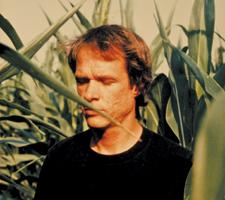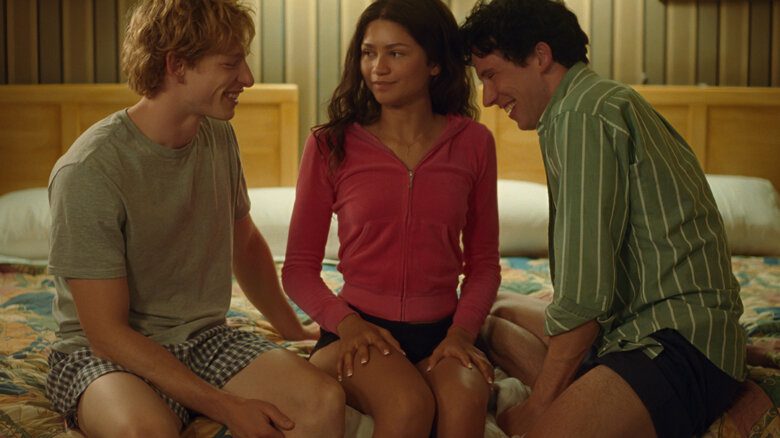Arthur Russell was gay, a Buddhist, an underground disco producer, an avant-garde cellist, a new music composer and a songwriter in the downtown New York scene of the 1970s and ’80s.
Largely unknown outside the city — he died of AIDS in 1992 at age 40 — his work is only recently receiving the attention it deserves. A documentary in the Vancouver International Film Festival, Wild Combination: A Portrait of Arthur Russell, traces Russell’s journey from Iowa, where he grew up among tractors and cornfields, to San Francisco circa 1967, to New York, where he worked alongside Allen Ginsberg, Phillip Glass, Robert Wilson, the Talking Heads, and many others.
Xtra West spoke with Wild Combination director Matt Wolf about Russell and the film — a tender portrait of the musician and those who loved him.
Matt Wolf first heard of Arthur Russell as a “long forgotten, HIV+ gay disco auteur” often seen listening to his own music on a Walkman on the Staten Island Ferry.
“That description was really compelling to me. Then I got his music, and became obsessively involved in it,” Wolf recalls. “So I contacted Tom Lee, Arthur’s boyfriend from that period, and asked permission if I could potentially use the music in some sort of project. At the time, I thought it would be an experimental film,” Wolf explains.
But when he met the “really sweet, generous and open” Lee, who was still living, at that time, in the apartment that he had shared with Arthur, Wolf felt that the project could be much larger than he initially imagined.
Wild Combination, though a first feature, is not Wolf’s first project to deal with HIV/ AIDS. Among his student works are the shorts I Feel Love — about so-called “gay serial killer” Andrew Cunanan, who murdered Gianni Versace and others, allegedly out of rage at having discovered he was HIV+ (which he wasn’t) — and Smalltown Boys named after a Bronski Beat song prominently featured in the film Parting Glances.
Smalltown Boys, Wolf informs me, is, in part “a very untraditional biography of David Wojnarowicz, this angry and powerful and prolific gay activist,” who died of AIDS the same year as Arthur Russell. Wolf was 10 years old at that time, watching stories of AIDS on television, but not really understanding “the intensity of what was going on.” He is now 26.
“As a gay person, I’ve been preoccupied by that time period and the impact it had on our culture, and all of these powerful and compelling people dying prematurely in the late ’80s and early ’90s from HIV and AIDS,” Wolf says.
Wild Combination unfolds without mention of AIDS or Russell’s death until 50 minutes in, yet by the time it comes around, most viewers have long since guessed why Arthur is absent.
It’s “yeah, he’s a gay artist, a guy from the ’90s — that’s your assumption,” Wolf notes.
The ease with which we go there, unbidden — and how unsurprised we are to hear Lee tell of Russell’s diagnosis — drives home for the viewer how huge the impact of AIDS has been. But the strategy, Wolf explains, was more about wanting to tell Russell’s story in a linear fashion.
Wolf says there was discussion about introducing Russell’s death at the start of the film and then revisiting it later in the narrative. But he says he knew from the get-go that he wanted the film to begin in Oskaloosa — with interviews with Arthur’s parents, Charles and Emily Russell.
The Russells obviously still feel great loss at the passing of their son, while not entirely understanding his passions.
Emily Russell tells a rather sweet story of how she discovered that her son was gay, and Charles recounts a conversation where he tries to talk Arthur into coming home from the commune in San Francisco (where he was meditating, meeting with Allen Ginsberg, and practicing the cello) to work alongside him in the insurance business. Both refer to him throughout by his childhood name, Charlie.
Still, Wolf tells me, he found them very worldly. “They possessed a sort of wisdom and depth and curiosity that I think defies perhaps our stereotypes and expectations of people who have lived in the Midwest their entire lives.”
Wolf attributes the warm reception his film is receiving to the likelihood that many viewers “just fall in love with Chuck and Emily and with Tom.”
“That was the idea. I felt this kind of love for Arthur Russell; I fell in love with his music and had a sense of idealization or love for his relationship with Tom and his parents,” Wolf adds. “I think that the audience picks up on that feeling from me. It’s in the film.”
Wolf leaves news of Arthur’s HIV diagnosis until close to the end to increase the emotional impact, and — in terms of narrative structure — to serve as a “way of helping Tom and the Russells unite,” which he wanted as the climax to the story.
“I felt like that would build most intensely out of Arthur’s death, and that it was most appropriate to bring that towards the end.”
Wolf says he wanted to be particularly sensitive “in terms of discussing Arthur acquiring HIV and Tom not being HIV+.”
“It was my choice that that was Tom’s story to tell, and I was going to let Tom discuss it however he felt comfortable with it,” Wolf reveals. “Some people have said that the film could be more hardnosed, in terms of investigating that infidelity in their relationship, but I find that to be kind of moralizing and a weird kinda ‘hetero’ suggestion,” he contends.
In addition to rare archival footage of Russell, “fake archival material” shot on 1980s technology, and uber-rare footage of the underground disco scene in New York, Wolf uses several old photographs of Russell to illustrate his documentary.
Russell often posed in plaid shirts and truckers’ hats, an unusual aesthetic for either the arts scene or the disco scene in New York in the 1970s and 1980s.
“I think it was a conscious self-fashioning to be this kind of downtown New York farmboy. He was wearing truckers’ hats, plaid shirts and Pumas before it was cool!” Wolf says with a laugh. “I think Arthur’s personal style is so the way people dress now. And he made an amazing record that was unreleased, with songs all called ‘Corn.'”
In fact, Wolf says, one of a series of previously unreleased Russell recordings now finding its way onto CD, Love is Overtaking Me, is replete with country and folksongs, and includes a lot of corn-related imagery, too.
“I think there was this definite sense of pride in, and a knowing preservation of, his Midwestern roots in his self-presentation,” Wolf notes.
While there is a resurgence of interest in Arthur Russell among music fans in general, Wolf ends by telling me that he hopes that Wild Combination is “regarded as a queer film.”
“I mean, the film appeals to straight people as well, but I love that queer audiences are experiencing the film, and I think they do respond to it in a more intense way than straight people.”

 Why you can trust Xtra
Why you can trust Xtra


